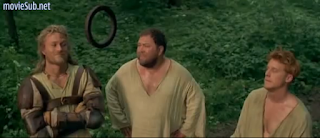The Princess Bride is a classic medieval movie which encapsulates perspectives from the Middle Ages in a unique way. As opposed to knights in shining armor, sword fighting, and castles (which the film has its fair share of anyway), this movie attempts to create a more romantic portrayal of what it meant to be medieval. Our hero, Westley, is neither born into nobility, nor does he strive to ascend into it, and yet he and his companions are portrayed as being more noble of character than anybody who actually was born into it.
Being critical of those in power who are supposed to be righteous, and uplifting those in the lower class as generally of better character is especially familiar when considering a medieval work by Geoffrey Chaucer called The Canterbury Tales. In fact, this film further reflects Chaucer’s work by borrowing his narrative style and setting the story up as a frame narrative. In this instance, a grandfather is reading the story of The Princess Bride to his sick grandson. By using a frame narrative in this instance, the story becomes more relatable to the audience, forgiving its more fantastical elements, and allowing for a modern commentary on the story, primarily that of the sick grandson who repeatedly interrupts the story when something goes wrong.
The story itself begins by presenting different levels within the class system. It pits the lower class, a farmhand named Westley, against nobility, Prince Humperdinck, with Buttercup caught somewhere in between. Buttercup, though a farm girl, begins on a level slightly above Westley, as she gives him orders- though this could just be the dynamic of their personal relationship. She is regarded by the Prince as a commoner who he has chosen to become his princess. This is unique in its way of countering the class immobility of medieval times, as opposed to characters like William Thatcher in A Knight's Tale, who work towards this goal. It's also unique in that it's not Buttercup's choice, nor even something she especially wants, but like marriage, is not something she has a say in. The purpose for Buttercup’s engagement is later revealed as a plot of Humperdinck’s to declare war on the neighboring country, presumably because the assassination of a nobly born woman would have been too risky.
Swordplay has a role in this story, though is not as predominantly featured as it is in many other medieval-set movies. Interestingly, it chooses to focus specifically on fencing in its fight scenes, which wasn’t a common practice until after the Middle Ages. Plate armor, a common feature in medieval-set films, showed up in the castle guard, but was otherwise mostly absent. If our hero is in any way a knight in shining armor, than his shining armor is True Love, which saves his life in the end. Either way, the lack of plate armor works with the fencing style of fighting, in which lighter armor is more appropriate to move quickly, but this seems to detract more from giving the film a medieval feel, rather than add to it.
It is when Miracle Max asks what reason Westley has to live that Westley saves his own life by answering “True Love,” of which Inigo Montoya argues there is no cause more noble. It seems important that Miracle Max is described as a miracle as opposed to magic, as this movie plays both on miracles and superstition. Superstition would influence the concept of a magic-worker as an evil thing, while miracles are attributed to the will of God, absolving the miracle worker of any negative influence. The superstition becomes more apparent with the near-mythological status of the Dread Pirate Roberts, from whom the castle guard flees in fear as they believe they have encountered him (which I guess technically they have). Westley’s success in this ploy allows them to storm the castle.
The castle itself is indicative of the medieval setting, and its storming marks the climax of the story. Throughout the film the castle serves as a prison for Princess Buttercup more than anything else, reflecting the way in which all women of nobility were prisoners in the Middle Ages, waiting to be traded to other families for political alliances. Its existence also allows for Westley, Inigo, and Fezzik to storm the castle, save the princess, and exact their revenge, of course with a fight scene or two thrown in for good measure.
Many aspects of this film allow for it to be considered as medieval with a romantic twist. Numerous characters with distinct personalities, the tendency for the lower class to behave more nobly, pretty (if not realistic) swordfighting, and True Love winning out in the end.




